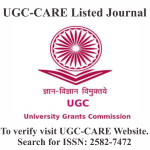ENHANCING ENGLISH WRITING SKILLS IN ENGINEERING STUDENTS THROUGH A FLIPPED CLASSROOM APPROACH.
DOI:
https://doi.org/10.29121/shodhkosh.v5.i1.2024.3983Keywords:
Flipped Classroom, Communication Skills, Writing SkillsAbstract [English]
Students in the 21st century are looking for an educational system that supports their needs. The focus of teaching has shifted from being teacher-centered to student-centered through innovative methods. With technology and globalization advancing, strong communication skills in English are crucial for engineering students as they are key for employability. Communication is one of the 12 essential Programme Outcomes defined by the National Board of Accreditation (NBA). The four fundamental language skills—listening, speaking, reading, and writing (LSRW)—play a significant role in developing English communication abilities. While all these skills are important, writing serves as a foundation for effective verbal communication, yet it can be challenging to master without a solid grasp of the other three skills. This paper investigates how the Flipped Classroom approach can be effectively applied in English language classrooms to enhance the writing skills of 30 Third-Year B.E students, along with other essential 21st-century skills.
Background: The current teaching methods have evolved from traditional lectures to incorporating cooperative and collaborative learning, along with Information and Communication Technology in English classes. Some effective approaches include computer-assisted language learning, mobile-assisted language learning, project-based and problem-based learning, flipped classrooms, and task-based language learning. The present study examines how well the flipped classroom model helps improve undergraduate students' writing skills. The study focused on a group of college students enrolled in a writing course. In the flipped classroom approach, students watched recorded lectures and completed online activities before attending in-person classes. During these classes, they worked on writing tasks with their instructor's help. The research used a mixed-methods design, which included analyzing data from tests taken before and after the course to measure changes in writing skills. It also gathered student opinions through surveys. The results suggest that the flipped classroom approach is effective in improving students' writing. The test scores showed a significant improvement in their writing skills, and the students reported that the method was engaging, flexible, and beneficial for their learning. In conclusion, this study emphasizes the potential of the flipped classroom model to enhance writing skills in undergraduate students.
References
Bergmann, J., & Sams, A. (2012). Flip your classroom: Reach every student in every class every day. International Society for Technology in Education.
Gitsaki, C., Robby, M. A., Priest, T., Hamdan, K., & Ben-Chabane, T. (2013). A research agenda for the UAE iPad initiative. Learning and Teaching in Higher Education: Gulf Perspectives, 10 (2), 1-15. DOI: https://doi.org/10.18538/lthe.v10.n2.162
Brame, C. J. (2013). Flipping the classroom. Retrieved from: http://cft.vanderbilt.edu/guidessub-pages/flipping-the-classroom/
Goldschmid, B., & Goldschmid, M. L. (1976). Peer teaching in higher education: A review. Higher Education, 5 (1), 9-33. doi: 10.1007/BF01677204 DOI: https://doi.org/10.1007/BF01677204
Yang, Y. C., & Wu, W. I. (2012). Digital story telling for enhancing student academic achievement, critical thinking, and learning motivation: A year-long experimental study. Computers & Education, 59 (2), 339-352. doi: 10.1016/j.compedu.2011.12.012 DOI: https://doi.org/10.1016/j.compedu.2011.12.012
Dörnyei, Zoltán. "Attitudes, Orientations, and Motivations in Language Learning: Advances in Theory, Research, and Applications." Language Learning, vol. 53, no. 1, 2003, pp. 3-32. DOI: https://doi.org/10.1111/1467-9922.53222
Hiradhar, Preet. "Enhancing ESL Learners’ Writing through Technology." IPEDR, vol. 68, no. 7, 2013, https://doi.org/10.7763/IPEDR.V68.7.
Raval, M. R. "Use of ICT in English Language Teaching." International Journal of Research in All Subjects in Multi Languages, vol. 2, no. 2, 2014.
Shyamlee, D. Solanki. "Use of Technology in English Language Teaching and Learning: An Analysis." Medias and Culture, IPEDR, vol. 33, IACSIT Press, 2012.
Singh, J., Matthees, B., and A. Odetunde. "Learning Online Education During COVID-19 Pandemic—Attitudes and Perceptions of Non-Traditional Adult Learners." Quality Assurance in Education. Advance online publication, 2021, https://doi.org/10.1108/QAE-12-2020-0147 DOI: https://doi.org/10.1108/QAE-12-2020-0147
Downloads
Published
How to Cite
Issue
Section
License
Copyright (c) 2024 Soebmahamed Y Pathan, Vaseem Qureshi

This work is licensed under a Creative Commons Attribution 4.0 International License.
With the licence CC-BY, authors retain the copyright, allowing anyone to download, reuse, re-print, modify, distribute, and/or copy their contribution. The work must be properly attributed to its author.
It is not necessary to ask for further permission from the author or journal board.
This journal provides immediate open access to its content on the principle that making research freely available to the public supports a greater global exchange of knowledge.




















